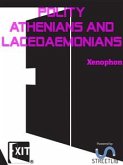I
Claiming to have attained some proficiency in horsemanship (1) ourselves, as the result of long experience in the field, our wish is to explain, for the benefit of our younger friends, what we conceive to be the most correct method of dealing with horses.
(1) Lit. "Since, through the accident of having for a long time
'ridden' ourselves, we believe we have become proficients in
horsemanship, we wish to show to our younger friends how, as we
conceive the matter, they will proceed most correctly in dealing
with horses." {ippeuein} in the case of Xenophon = serve as a
{ippeus}, whether technically as an Athenian "knight" or more
particularly in reference to his organisation of a troop of
cavalry during "the retreat" ("Anab." III. iii. 8-20), and, as is
commonly believed, while serving under Agesilaus ("Hell." III. iv.
14) in Asia, 396, 395 B.C.
There is, it is true, a treatise on horsemanship written by Simon, the same who dedicated the bronze horse near the Eleusinion in Athens (2) with a representation of his exploits engraved in relief on the pedestal. (3) But we shall not on that account expunge from our treatise any conclusions in which we happen to agree with that author; on the contrary we shall hand them on with still greater pleasure to our friends, in the belief that we shall only gain in authority from the fact that so great an expert in horsemanship held similar views to our own; whilst with regard to matters omitted in his treatise, we shall endeavour to supply them.
Claiming to have attained some proficiency in horsemanship (1) ourselves, as the result of long experience in the field, our wish is to explain, for the benefit of our younger friends, what we conceive to be the most correct method of dealing with horses.
(1) Lit. "Since, through the accident of having for a long time
'ridden' ourselves, we believe we have become proficients in
horsemanship, we wish to show to our younger friends how, as we
conceive the matter, they will proceed most correctly in dealing
with horses." {ippeuein} in the case of Xenophon = serve as a
{ippeus}, whether technically as an Athenian "knight" or more
particularly in reference to his organisation of a troop of
cavalry during "the retreat" ("Anab." III. iii. 8-20), and, as is
commonly believed, while serving under Agesilaus ("Hell." III. iv.
14) in Asia, 396, 395 B.C.
There is, it is true, a treatise on horsemanship written by Simon, the same who dedicated the bronze horse near the Eleusinion in Athens (2) with a representation of his exploits engraved in relief on the pedestal. (3) But we shall not on that account expunge from our treatise any conclusions in which we happen to agree with that author; on the contrary we shall hand them on with still greater pleasure to our friends, in the belief that we shall only gain in authority from the fact that so great an expert in horsemanship held similar views to our own; whilst with regard to matters omitted in his treatise, we shall endeavour to supply them.









